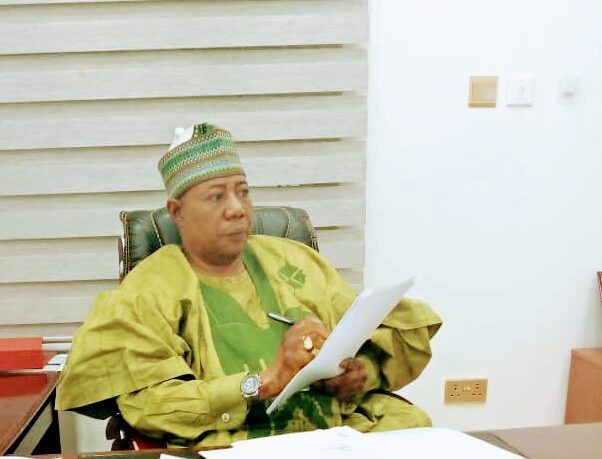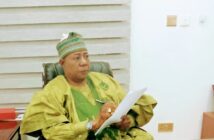The national aspirations of nations are reflected in their mission statement, usually captured in national anthems. As citizens recite it on a daily basis, it becomes part of their lives. For Nigeria, the aspiration from the beginning was to build a nation, where prosperity, peace and unity will reign.
This national aspiration was captured in our National Anthem thus: “Arise, O compatriots, Nigeria’s call obey; to serve our fatherland, with love and strength and faith; the labour of our heroes past shall never be in vain; to serve with heart and might; one nation bound in freedom, peace, and unity.”
In other to give effect to the desires of our founding fathers that their labour and sacrifices shall not to be in vein, President Muhammadu Buhari, on assumption of office in 2015, hit the ground running in order to recalibrate the path and destiny of Nigeria to the desires of our founding fathers.
One of the steps Buhari began to take was deepening the root of democracy by empowering state institutions to defend democracy. Just when Nigerians are beginning to celebrate the return of glory days, mischief makers are everywhere calling for the return of Nigeria to a regional system of government.
Globally, the relevance of regional structure as a governmental system in a multi-ethnic society has continued to dim because its application in many climes ended in a fiasco. A good example is the Soviet Union. This explains why the recent calls by some individuals and groups for Nigeria to return to regionalism are not only shameful but regrettable. Shameful because they are without fervent recourse to why we dumped regionalism for state structure, beginning from 1967, and the American styled presidential system of government in the 1979 constitution.
Nigeria’s adoption of a regional approach to development at the turn of the 50’s, which heralded our Independence in 1960, was meant to accelerate local content and fast-track development for a nation just emerging from depravity.
However, the system ended in turmoil to the detriment of our national consensus and cohesion. As a people, what we learnt from the 1960-66 regional experiment was not palatable for any individual or group to call for a return to where we got our fingers burnt.
There are some who have even called for the setting up of an interim administration at the end of the tenure of President Muhammadu Buhari. But not a few Nigerians have described this particular one as a call to anarchy.
Sadly, these calls are not coming from the younger or ‘naive’ generation but the very older folks who were there from the beginning. They should ordinarily qualify to be called statesmen, but their relentless anti-government rhetoric leaves much to be desired about their statesmanship. The whole idea of such activism is obvious – to denigrate and downplay the effort the Buhari administration is making to keep Nigeria as one entity in line with the real intent and spirit of our founding fathers, the Sardauna of Sokoto, Sir Ahmadu Bello; Chief Nnamdi Azikiwe, the late Tafawa Balewa, and Chief Obafemi Awolowo, among others.
Elsewhere, statesmen are citizens of immense wealth of experience which the society leverages on in times of extraordinary public health, economic, political and social emergencies. Statesmen are people of exceptional leadership acumen, characterised by vision, courage, compassion, effectiveness and civility. The implication of the foregoing is that statesmen are not supposed to be rabble rousers.
Unfortunately in Nigeria, the so called statesmen who are supposed to serve as the moral compass of the society are the ones fanning the embers of discord. Instead of speaking from the depth of their wealth of knowledge and wisdom to trigger positive national discourses, they meet in a clandestine manner to throw all kinds of tantrums to overheat the polity and incite the people against the government.
Instead of using their financial status to improve Nigeria’s economy, they are busy spending on meaningless conferences put together to instigate the youths and discredit the Buhari administration, which is one of the most accepted governments of the Nigerian people. Thanks to our intelligence community which has been unraveling all the conspiracies that have been happening in Nigeria. The proponents of regionalisms should perish their thought and think instead of supporting the welfare of Nigerians.
No one can deny that there are still teething problems with the presidential system in operation. However, it is not enough to call for a return to the regional system. The 49 statesmen, otherwise known as wise men, who drafted the 1979 Constitution knew Nigeria was desirous of a system that would unite and produce a nationally accepted leader.
The danger in these calls is that statesmen are losing their steam or compromising in order to do damage to national aspirations. If not, how can any sane group call for a return to the system that ended up killing our revered leaders and deeply polarised our dear nation? Is it not because of the devastating effects of the regional system of government adopted in the First Republic that the revered former head of state, General Yakubu Gowon (rtd), federalised Nigeria to serve as springboard for ethnic harmony and national consensus.
I stand to corrected that since General Gowon changed Nigeria from a four regional structure to a federation of 12 states and subsequently to 36 states and the Federal Capital Territory (FCT) by other subsequent administrations, Nigeria has recorded tremendous level of unity and ethnic harmony, as every Nigerian of voting age is free to contribute to electing the president, as against what entailed in the regional system where a member representing his tiny constituency is selected/elected by the parliamentarians as prime minister.
The merit of a federal structure over regionalism is like the difference between darkness and light. In any case, these agitations may not even be out of any patriotic concern but a fight for political interest and stomach infrastructure, which the Buhari administration did not hesitate to discourage.
Let this truth sink into the minds of those calling for a return to regionalism that the geo-demographic complexity of the Nigerian state and society makes federalism the most appropriate political system for the country.
There is no denying that the system is not working the way it ought to in its current incarnation, but it has lived up to the expectation of the country’s founding fathers in ‘holding together’ the diverse ethnic groups in the country as well as in achieving ‘unity in diversity’.
Instead of abandonment, we should be talking of how to make it work efficiently, especially under the Buhari government which has done a lot to ensure true federalism. A lot of advantages come with staying with the federation as a protection against tyranny. One of the most important points of federalism in dividing the power between the national government and state governments, and spreading the national government’s power among three branches that serve as a check and balance on each other is that it serves as a deterrent to tyranny.
The protections we have in our system against a tyrannical, runaway government are one of the most important points to why the system was designed the way it was.
The current system enhances efficiency. When some of the power of the government is dispersed among the states, giving them the right to solve some of their own problems, you allow for more efficiency within the system. To try to have a national solution to all problems, which could be referred to as a ‘cookie-cutter method’ of law and policy making, is to end up with solutions that are more effective in some states and less effective in others.
To allow states to create solutions to their own problems, using policies and laws that work best in their state, means that each state can come up with its own solution, making governance more efficient. Let it be known to those politicising everything, including sensitive state matters, that posterity will judge them according to their works.
– Ibrahim is director, Communications and Strategic Planning, of the Presidential Support Committee (PSC)



